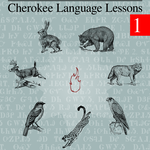
ᏘᎪᎵᏯ (Read them)
-
ᎠᏂᎠᏫ
[a¹ni²ɂạ²hwi] “The deer people.” -
ᎠᏂᎩᏟ
[a¹ni²gi²hli] “The dog people.” -
ᎠᏂᏥᏍᏚ
[a¹ni²ji²sdu] “The rabbit people.” -
ᎠᏂᏩᎭᏯ
[a¹ni²wạ²hạ²ya] “The wolf people.” -
ᎠᏂᏪᏌ
[a¹ni²we²³sa] “The cat people.”

☞ ᎦᏬᏂᏍᎬᎢ ᎠᎦᏔᎲᎢ - “His ongoing speaking - his ongoing knowing how.”
☞ Don’t get hung up on grammar information. Grammar is not something that needs to be memorized or fully understood. It is through the exercises in the lesson material that you will learn how to understand and speak Cherokee, not by memorizing rules and word parts.
Clitics are special word endings that are used to add or change the meanings of existing words. They are a very powerful feature of the Cherokee language and allow you to express a great many complicated things in short order. It is important to note that these endings cannot be used alone. They must always be combined with an existing word to form a new word.

☞ Remember that if you are having problems recognizing any of the Syllabary you should do the final Syllabary exercise as a refresher.
Review the following vocabulary then do the exercises.
☞ Reminder: Animacy refers to whether a thing is alive or not. Most alive things are considered animate. Most non-living things are considered inanimate.

The Cherokee syllabary was invented by a single individual named Sequoyah (ᏍᏏᏉᏯ) to write the Cherokee language in 1819. He is credited as the only known person in history to create an alphabet from scratch without knowing how to read or write.
Around 1809, impressed by the “talking leaves” of European written languages, Sequoyah began work to create a writing system for the Cherokee language. After attempting to create a character for each word, Sequoyah realized this would be too difficult and eventually created characters to represent syllables… He worked on the syllabary for twelve years before completion… The rapid dissemination of the syllabary is notable, and by 1824, most Cherokees could read and write in the newly developed writing system.
In 1828, the ordering of the Syllabary and each letter’s shape were modified by Cherokee author and editor Elias Boudinot to adapt the Syllabary to the printing press… for the creation of the “Cherokee Phoenix (ᏣᎳᎩ ᏧᎴᎯᏌᏅᎯ)”, the first newspaper published in a Native American language… A digitized, searchable version of the paper is available through the University of Georgia Libraries and the Digital Library of Georgia.